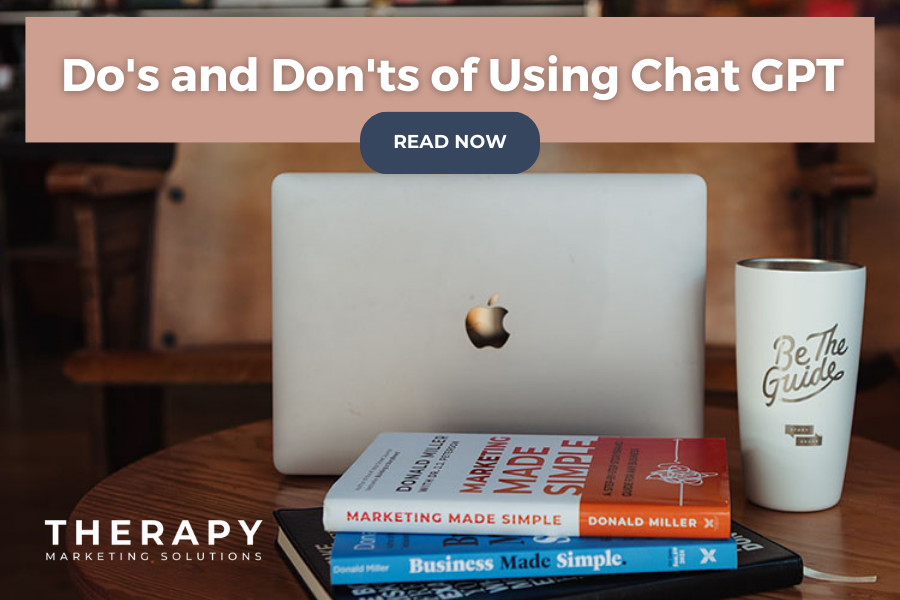In the rapidly advancing field of therapy and allied-health, effective communication is pivotal. With the rise of innovative technologies, one tool that’s making waves is ChatGPT. Developed by OpenAI, ChatGPT is a revolutionary language model that has the potential to transform how we create content and post on social media and other platforms. Here is a link to some more detail on ChatGPT. As allied-health professionals, harnessing the power of this tool can be a game-changer for your practice, but it’s important to tread carefully and be aware of its limitations.
Embracing ChatGPT’s Potential
As allied-health professionals, your expertise and knowledge deserve to be showcased in the best possible light. ChatGPT can be a valuable ally in achieving this. Imagine using it to help you generate engaging blog content that resonates with your audience, crafting impactful social media posts that draw attention, and creating compelling website copy that informs and persuades. The possibilities are virtually limitless. However, it’s crucial to acknowledge that while ChatGPT is a powerful tool, it’s not a substitute for your unique insights and professional judgment. ChatGPT’s capabilities are indeed impressive, but it’s essential to approach its usage with a discerning eye. While it can aid in content creation, it can’t be fully trusted to produce accurate, expert-level content. Here, we’ll delve into some do’s and don’ts to help you leverage ChatGPT effectively within your practice.
The Do’s of ChatGPT:
Brainstorming: Use ChatGPT as a brainstorming partner. If you’re stuck on ideas, its creative prompts can provide a fresh perspective. You can’t always be expected to see every angle and come up with every idea, so give this AI a try here.
Enhancing Sentences: Incorporate ChatGPT to enhance sentence structure, making your writing more polished and engaging. Maybe you’re just looking for a better way to write a sentence. ChatGPT is great for that!
Fun Titles and Headings: Generate attention-grabbing titles and headings that resonate with your audience and boost readability. Try telling ChatGPT to come up with 20 different titles at a time and see if you like any of them.
Hashtag Generation: When crafting social media posts, ChatGPT can help generate relevant hashtags, enhancing your posts’ discoverability.
Answering Questions: Use ChatGPT to address any questions that you might have about social media platforms, grammar, laws and other straightforward topics like these.
The Don’ts of ChatGPT:
Blind Reliance: Don’t assume ChatGPT’s output is infallible. Always review and edit the content it generates to align with your expertise. Note that it also cannot cite information or other authors for you.
Expertise Trust: Avoid relying solely on ChatGPT for professional advice. Your specialized knowledge is irreplaceable.
Confidential Information: Never share sensitive or confidential patient information with ChatGPT, as it lacks the capacity to ensure privacy.
External Information: Refrain from asking ChatGPT to provide information directly from external websites. It might not always offer accurate data.
Tips for ChatGPT Beginners:
Regenerate If Unsatisfied: If the generated content doesn’t meet your expectations, ask ChatGPT to generate new versions until it aligns with your vision.
Seek Clarification: If a response seems unclear or inaccurate, ask for clarification or more detailed information. It will remember your previous conversation points.
Specify Word Length, Tone, Audience: Be explicit in your instructions regarding word count, desired tone, and target audience to achieve desired results.
Request Specific Changes: If you like most of the content but need certain aspects altered, ask ChatGPT to modify those specific points.
Play around with this fun tool and get to know its limitations. Maybe you’ll decide not to use this tool for your practice but you may just find that it’s expertise is a great help in finding your new favorite recipe or date night. The opportunities are endless!
A Final Note
Technologies like ChatGPT offer a world of possibilities. It can streamline your content creation process, save time, and enhance your digital presence. However, it’s important to remember that while ChatGPT is a powerful tool, it’s not a replacement for your expertise, empathy, and human touch. If used at all, it should be used as a companion, not a crutch.
In conclusion, as allied-health professionals, you’re at the forefront of embracing innovation in many different aspects. The emergence of tools like ChatGPT opens doors to new horizons. Embrace it for its potential, experiment with its capabilities, but always do so mindfully. Use it to amplify your strengths, not to overshadow them. By integrating ChatGPT into your practice with caution and care, you can elevate your content, engage your audience, and continue to provide the exceptional care that sets you apart.

